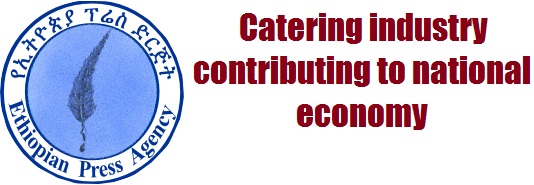
Catering industry is growing at meaningful pace and contributing to the national economy since recently, said experts.
By the year 2018, Ethiopia Travel and Tourism economy grew by 48.6 percent, the largest of any country in the world, according to World Travel and Tourism Council, Travel and Tourism contributed 202 billion Birr or 7.4 billion USD to the country’s economy, an increase of 59 billion Birr on 2017.
Catering industry is contributing
to local and national economies in several ways through purchasing food and related items from local producers.
The catering industry in Ethiopia is adding value towards national economy, catering expert tells, The Ethiopian Herald.
Recently, the catering industry is contributing at large to national economy replacing foreign currency out flow, producing variety of food items using local inputs, D.r Ayalew Sisay, Catering Expert, says.
According to him, businesses in catering industry have been operating and maximizing profit, creating job opportunities to the local community. In return, the wages also contribute to tax and support economic growth in which it will speed up the expansion of various services and infrastructures development such as transport, health and education. Now, hotels largely consume local inputs to prepare a variety of foods purchasing from local farmers and businesses, he adds.
Asrat Begashaw, Corporate communication Director at Ethiopian Airlines for his part says that as the number of tourists and travelers
coming to Ethiopia increasing time to time, the industry has showed significant growth. Accordingly, the consumption and production of food items is increasing. The preparation of diversified food items including cultural foods is augmenting to satisfy the need of every passenger. And it is a good opportunity to promote indigenous culture and value of the country.
As the hospitality business in Ethiopia is booming, catering institutes are producing professionals and can feed both the international brand hotels investing in the country and the emerging local hotel brands, Dr. Ayelew adds.
According to documents, Ethiopia continues to being recognized among the world’s renowned tourist destinations attributed Addis Ababa to third largest diplomatic community next to Washington DC and Geneva. It is ranked among the ten largest markets for chain hotel development in 2018.
As to Asrat, the catering sector has huge economic importance. Ethiopian Airlines has a production capacity of more than 100,000 food per day. “We have made an agreement with Meki Batu Farmers Association to supply inputs. Association brings fresh local inputs every day to utilize for further production process.” The enterprise also supply some food items for foreign airlines when they transit through Ethiopia.
He states that the Ethiopian Airlines has modern food production and training center with international standard. It is further performing diversified food items and increase production capacity.
Now, the Airlines is contributing to country’s national economy in producing and supplying trained man power to the market, creating huge job opportunities and generating foreign currency, he points out.
Consuming local inputs for food production enables to save foreign currency. The sector has a great contribution for national economy by securing foreign currency. In fact, the contribution of catering sector for the national economy is interrelated with the tourists flow, Dr. Ayalew states.
According to him, the country has blessed in natural, cultural and historical attractions, but it is a largely untapped tourism market including catering sector. “In my opinion, no country has abandent and spectacular tourist attractions than Ethiopia.” Ethiopia ranked 1st from African countries in registering its tangible and intangible heritages in UNSECO’s list.
Tourism and catering structure in Ethiopia is found in a good condition. But, there are some constraints that do not encourage the flow of tourists. Lack of adequate infrastructure development, trained man power, and others are posing threat on the tourism industry. Regarding service delivery, the catering professionals should change their attitude to afford quality service to meet the international standard, he notes.
Ethiopia’s tourism sector is showing a steady increment. International tourist flow is rising time to time. For instance, Ethiopia experienced the highest tourism growth in the world, in 2018, surpassing the global average growth rate of 3.9 percent and the African average of 5.6 percent. Now, the sector has 9.4 percent share of total economy.
It is mainly driven by international visitors spending, country’s improved connectivity as a regional transport hub and to recent visa relaxation policies, performance of aviation and the development of Addis Ababa as a dynamic and growing regional hub.
On the other hand, the expansion of hotels, lodges and other tourism facilities play a vital role in increasing tourist flows. Accordingly, the numbers of available hotels are expanding, Ayalew explains.
As to documents, the Ethiopian catering industry has grown quickly over the last years, and there remains a lot of untapped potential. Exploiting these opportunities with the help of new technologies, and accommodation service providers will support the country’s plan to become one of Africa’s top destinations.
To stimulate tourism growth and development, it needs to improve the hotel industry service delivery and the infrastructure that supports it. The cooperation of stakeholders’ such as government, hotel professionals, hotel owners and hotel trade associations is critically imperative to achieve a competitive and sustainable sector.
Recently, several people are joining the catering business aiming to exploit the market created by international and locally organized events and meetings.
The Ethiopian Herald June 6/2011
BY TSEGAYE TILAHUN




